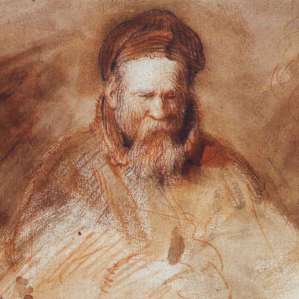What did Paul mean when he used the Greek word arsenokoitai?
by Rene
(Switzerland)

Philo of Alexandria
helps us define arsenokoitai

That's a great question because Paul could have used many words if he intended to blast gays and lesbians. Yet Paul used none of those available words, choosing instead to coin an interesting new word, arsenokoitai.
Despite what some scholars allege, arsenokoitai is never used in any extant Greek literature with our modern meaning of homosexual. The best evidence available today indicates that arsenokoitai described shrine prostitutes. That is the learned opinion of Philo, a contemporary of both Jesus and the apostle Paul and one of the most widely read Jewish intellectuals in the first century.
The apostle Paul, also a brilliant intellectual, was one of the most successful authors who ever lived. He wrote 14 short books in our New Testament, each of which has sold more than one billion copies. Paul received an exceptional education through private tutors including Gamaliel, the leading Jewish teacher of the first century, Acts 22:3.
Romans 1 indicates Paul had read and was familiar with Wisdom of Solomon, a book which is not part of inspired scripture and with secular writers of his day. Paul quotes at least three heathen writers in his inspired epistles, Epimenides, Aratus and Menander. He quotes Epimenides and Aratus in Acts 17:28, Menander in 1 Cor 15:32 and Epimenides in Titus 1:14.
Because Paul, AD 4 - 67, and Philo of Alexandria, 20 BC - AD 50, were contemporaries and because Paul was well educated and widely read, it is reasonable to believe that Paul was familiar with the writings of Philo, a fellow Jew and public intellectual, although not a fellow Christian. Philo understood Moses, in Leviticus 18:22 and 20:13, to be condemning shrine prostitution.
Philo's understanding that arsenos koiten refers to shrine prostitution is 2000 years old. It was a Jewish belief with which the Apostle Paul was familiar because Paul coins a new word describing temple prostitution using the Septuagint Greek words of Leviticus 20:13. Believing that Leviticus 18:22 and 20:13 refers to shrine or temple prostitution is not a modern belief invented by gays to alibi their "sin." It is the ancient Jewish and Christian belief for thousands of years.
Leviticus 18:22 - meta arsenos ou koimethese koiten gunaikos
Leviticus 20:13 - hos an koimethe meta arsenos koiten gunaikos
A Greek translation of Leviticus 20:13,
arsenos koiten, is probably the source of the Greek word Paul used in 1 Corinthians 6:9 and 1 Timothy 1:10. Many Christians believe Paul borrowed
arsenokoitai from the Septuagint translation of Lev 18:22 and 20:13. Therefore, it is vitally important to understand how ancient Jews and Christians understood these verses.
Understanding
arsenokoitai as a reference to shrine prostitution was the normal first century viewpoint, when Paul used his new Greek word,
arsenokoitai, in 1 Cor 6:9 and 1 Tim 1:10.
Dr. Gordon Fee, a leading conservative heterosexual Greek scholar, points out that
arsenokoites is rarely used in Greek literature
"especially when describing
homosexual activity." -The New International Commentary on the New Testament,
The First Epistle To The Corinthians, Eerdmans, 1987, Dr. Gordon D. Fee, p. 244.
Philo on shrine prostitution.
“(40) And I imagine that the cause of this is that among many nations there are actually rewards given for intemperance and effeminacy. At all events one may see men-women (androgynes) continually strutting through the market place at midday, and leading the processions in festivals;
and, impious men as they are, having received by lot the charge of the temple, and beginning the sacred and initiating rites, and concerned even in the holy mysteries of Ceres
(Ceres is another name for Cybele, the fertility goddess first century Romans referred to as the Mater Deum or Mother of the gods. Remember, Philo probably wrote this around AD 35.)
(41) And some of these persons have even carried their admiration of these delicate pleasures of youth so far that they have desired wholly to change their condition for that of women, and have castrated themselves and have clothed themselves in purple robes...
(Philo describes castrated Galli priests who served Cybele and other fertility goddesses throughout the Roman Empire and links them to Lev 18:22, 20:13 and Deu 23:17).
(42) But if there was a general indignation against those who venture to do such things, as was felt by our lawgiver..." (Moses was the Jewish Lawgiver. Philo refers to Moses' writings in Leviticus 18:22; 20:13 and Deuteronomy 23:17).
Philo, The Special Laws, III, VII, 40-42.
http://www.earlyjewishwritings.com/text/philo/book29.html When we remember that ancient Judaism did not view Leviticus 18:22 and 20:13
as applicable to lesbians, we must conclude that the Apostle Paul would therefore not have used words from Lev 18:22 and 20:13 to condemn lesbians in 1 Cor 6:9 and 1 Tim 1:10 because there was no basis in Old Testament law or Jewish thinking to do that.
Because the Jewish view was that Lev 18:22 and 20:13 (Deu 23:17) prohibited shrine prostitution, it is highly unlikely that Paul would have used
arsenokoitai with a meaning unfamiliar to most of his readers.
And because
arsenokoitai is never used in any extant Greek text from AD 57 to AD 1450, to refer to two men or two women in committed partnership, it is highly unlikely that Paul would have used
arsenokoitai with that meaning, which would have baffled his first century readers.
Viewing 1 Cor 6:9 and 1 Tim 1:10 as universal prohibitions of lesbianism and homosexuality and interpreting these verses to mean that lesbians and homosexuals cannot go to heaven is a relatively recent interpretation. It is certainly
not the predominant view for 2000 years of church history.Based on these historically and Biblically accurate facts, we conclude that neither God, nor Moses nor Paul intended anyone to understand that committed, faithful same sex partnerships are wrong, sinful, out of bounds, against God's will or unscriptural.
Our spiritual honest faithful to history and "faithful to scripture rightly divided" (2 Timothy 2:15) conclusion therefore is that 1 Cor 6:9 and 1 Tim 1:10 are not a negative blast against gays and lesbians.
They are instead, warnings against
temple prostitution. Paul is saying, 'God saved you
out of pagan religion so live in that reality and serve only the true God. Do not go back to worshiping false gods.'
What is the historical meaning of arsenokoites?
Return to Gay Christian FAQ
Return to 101 Community
Return to
Gay Christian 101 Home PageRene's Original Question:
"Dear Rick - May I just ask you one more question? I got in some trouble when rethinking a passage of your excellent book and I feel I really need your help.
I understand that the noun 'arsenokoites' in 1Cor 6:9 is a neologism from the apostle Paul. But I think Paul alludes most probably to the Septuagint, the Greek Old Testament of his times, where we find in Lev 18:22 – dealing with male-male sex as well as 1Cor 6:9 – the two separate words 'arsen' (Strong 730) and 'koite' (Strong 2845) appearing in the contextual meaning of 'man having sex with man'. Combining these words into a new noun, the meaning Paul intended could well have been 'men who engage in male sex'. Whatever the circumstances are.
The crucial point is: If Paul makes intentionally allusion to Lev 18:22, isn't he by doing so not implicitly confirming the validity of this verse for us today? As a general rule?
But how could this be if the Holiness Code was restricted to Israelites only and not binding on us? Or has the ban on cult prostitution which seems to be the common context of both the cited OT and NT passages nothing to do with the Holiness Code but with the first commandment?
You see I am rather confused and I would appreciate very much if you could give me some hints to find out.
Thank you very much. God bless you. - Rene"






